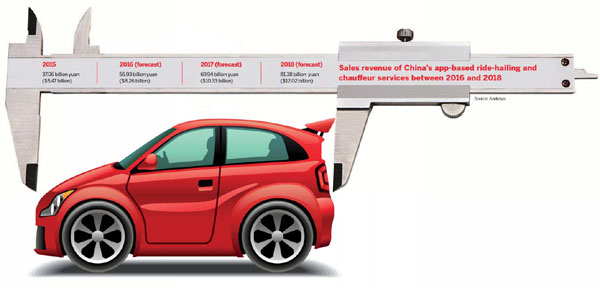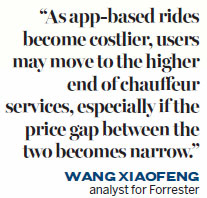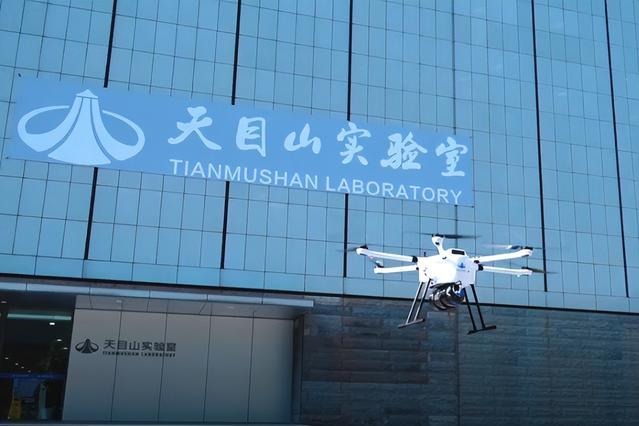Cab drivers get smart

Changing business landscape shifts taxi service focus from price to quality
Qu Liqun, 40, is a smart Hangzhou cabbie: He has installed as many as four smartphones and an iPad in his taxi.
The gadgets are not for communicating with family or for mobile entertainment. They're part of Qu's strategy to outsmart other cab drivers, and to survive and thrive in China's fiercely competitive ride-hailing market.
Hundreds of millions of Chinese now use smartphone apps to book rides. That ability is largely a result of a cash-burning war for market share waged until recently by Didi Chuxing and Uber China.

Their war produced a countrywide awareness of their services. It also spawned a market now estimated to be worth billions of yuan.
Not surprisingly, market-share-minded ride companies offered hefty incentives to drivers registered on their apps. By mid-September, about 15 million drivers, including those in private cars and rented, metered taxis registered as ride-providers on Didi alone - to work full-time or part-time, per their individual needs.
As for passengers, they too loved the apps because rides were much cheaper than regular taxis. Soon, regular taxi drivers were seething as their income began to plummet.
Other entrepreneurial drivers, including Qu, the Hangzhou cabbie, improvised.
"With more devices, I'll have a better chance of landing big-ticket orders," he says.

By that he means business travelers who book long-distance rides via apps. Business travelers, Qu says, are not price-sensitive.
"They represent the only niche where traditional taxis still have an advantage," he says. "In the mainstream market, we can't beat individuals who register their private cars on apps such as Didi and offer cheap rides, which generate additional revenue for them in their spare time."
Some commuters are switching back to regular taxis, as employers have stopped reimbursing receipts issued by private companies.
That's not the only bump in the road for the apps, which are visible players in the sharing economy. They began emerging in China in 2012 and enjoyed a smooth ride until this year, which is proving to be a watershed.
The Chinese government aims to boost the sharing economy in a bid to improve the services sector, spur consumption and create jobs. But the rise of private ride-hailing apps is seen as hurting traditional metered taxis.
Moreover, a few fear that a system without adequate checks and balances to filter out criminals seeking to be ride providers, could endanger passenger safety.
Earlier in October, several big cities proposed new rules on the types of vehicles that can be used as ride-hailing vehicles, and specifying who can drive them.
Metropolitan cities, including Beijing and Shanghai, have proposed that only cars with a certain length of wheelbase can provide app-based rides.
Some observers think the proposed regulations could increase the cost of rides and hurt the emerging business, which has already attracted billions of dollars in investment.
"The regulations practically allow only cars worth more than 200,000 yuan ($29,500; 27,000 euros; 24,300) to provide rides, which could push the majority of existing cars off the road," says Xue Zhaofeng, a professor at the National School of Development at Peking University.
A statement from Didi, China's largest ride-hailing service provider, said only one-fifth of its vehicles in Shanghai would meet the proposed requirements. Rides would become more expensive and less efficient due to the shortage of vehicles meeting the standards, it said.
But local governments think the new rules are necessary to tackle traffic congestion and air pollution.
Draft rules are now out for public comment. It is anyone's guess whether or not they will eventually pass muster in their current form.
Also, shrinking pay incentives provided by the ride-hailing companies are unnerving private drivers. Discounted, lower-than-cost rides that were used earlier to lure passengers away from traditional taxis, are also declining after criticism emerged that they constitute an unfair trade practice.
In August, Didi - whose estimated value is $33 billion - and the China unit of ride-hailing giant Uber Technologies Inc, based in the United States, decided to end their bitter rivalry and merge, a decision that is being scrutinized by China's antitrust authorities.
The merged entity is expected to command 90 percent of the market.
"The link-up is a sign that the era of heavily subsidized rides will likely end," says Zhang Xu, an analyst with the Beijing-based consultancy Analysys International.
Several drivers who used to offer app-based rides, have complained of shrinking income due to a decline in the number of passengers.
One Uber driver, surnamed Wu, originally from Henan province but now based in Beijing, said he earns up to 6,000 yuan a month if he works really hard.
"But many drivers earned nearly 200,000 yuan each last year when the subsidies were high, because a great number of passengers hailed rides using apps," Wu says.
He relocated to Beijing hoping to increase his income as an app-based ride-provider. But the draft local rules, if passed, could bar him from driving a cab in the capital.
Not just companies and drivers but even passengers are experiencing change. Liu Yinghua, a white-collar worker in Beijing, says she is back to subway commutes because app-based rides without discounts have become as expensive as metered taxis.
Liu owns a car but would hail rides via apps because they were cheap and saved her the trouble of finding parking spaces.
But not everyone is likely to emulate Liu. Wang Xiaofeng, an analyst for Forrester, says only very price-sensitive users would stop using taxis and ride-hailing apps. Such passengers do not help earn big profits anyway, she says.
"On the other hand, as app-based rides become costlier, users may move to the higher end of chauffeur services, especially if the price gap between the two becomes narrow," Wang says.
Also, she says, Didi used the app-based ride services and private cars in part as a tactic to create brand loyalty among customers. For Didi to earn a decent profit, it has to rely on the high-margin chauffeur business that provides high-quality services to passengers, she said.
Didi has already started providing such services.
To be sure, even this segment is not bump-free. Competition is stiff. Shouqi Limousine and Chauffeur, founded in 2015, hires only professional taxi drivers to drive its premium cars.
Ucar Technology Inc offers similar services. But it owns its cars and employs the drivers, unlike Didi, which swears by its asset-light business model of third-party cars rented by external drivers.
In this complex landscape, only one thing is certain: Everyone will attempt to become "smart" like Qu, the cabbie from Hangzhou whose car is packed with smartphones.
mengjing@chinadaily.com.cn
(China Daily Africa Weekly 11/04/2016 page25)
Today's Top News
- Evidence mounts of Japan's wartime atrocities
- Gunmen kill 11, wound many on Sydney beach
- Study finds Earth's deep water reservoirs
- China remembers victims of Nanjing Massacre 88 years on
- Philippines' provocations will avail it nothing: China Daily editorial
- China steps up financial support to spur consumption






























